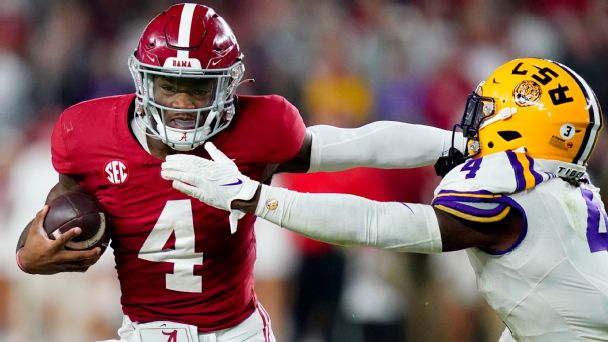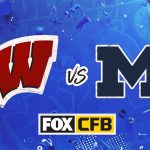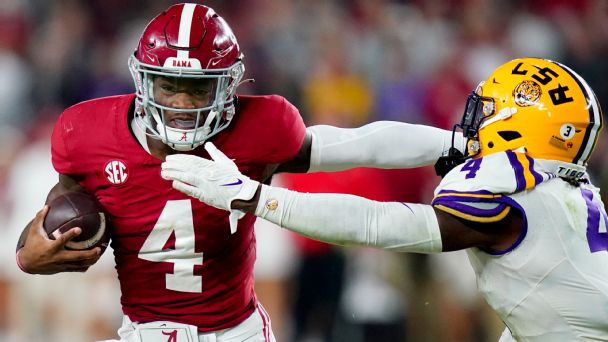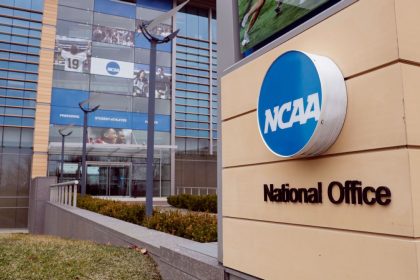
Washington’s Michael Penix Jr. and Oregon’s Bo Nix both transcended expectations and took the Huskies and Ducks to new levels in 2023. Cornelius Johnson and Josaiah Stewart became key role players on a brilliant and eventually unbeaten Michigan team. Texas’ Quinn Ewers, Florida State’s Jordan Travis and Michigan’s J.J. McCarthy all made game-changing leaps that either helped their teams find the College Football Playoff or should have. LSU’s Jayden Daniels took a leap to Heisman immortality. Alabama’s Jalen Milroe came through just enough to bring the Tide another CFP trip, while Ohio State’s Kyle McCord couldn’t quite do the same.
The 2023 Most Important Players list did its job, in other words. We had a lot of new QB starters and potential new star power heading into last season, and while some unknown quantities shined, others (Tennessee’s Joe Milton III, Penn State’s Drew Allar) fell a bit short. And it defined the national title race.
College football enters a new era in 2024, with an expanded College Football Playoff and, thanks to conference realignment, a condensed balance of power. But as always, new starters and breakthrough stars will define how the national title race plays out.
As I write in this piece every year, there are birds in hand, and there are unfinished products. The annual Most Important Players list is about the latter. Here are 25 players who could define the season with either moments or long spells of greatness. Some play for contenders, while others play for the teams that might prevent contenders from reaching their goals. All of them will have a chance to make their mark on 2024.
Jump to a section:
Transcendant stars | Spoiler QBs
Non-QB transfers | Who needs a breakthrough?
Ready for a big leap | Contender QBs

Pure transcendence potential
![]()
Most of this list involves who will impact the title race, not just the CFP race — with conference title autobids and 12 spots available, a proper list for the latter would require about 100 names. But while neither Colorado nor anyone else from the Big 12 will likely threaten to win the whole thing, Hunter’s unique brilliance commands a spot here all the same.
Hunter is a true two-way player, racking up big snap counts at both receiver and cornerback, and while he’s already among the best players in the nation, he still has room for improvement. He averaged a strong 2.3 yards per route run, but the best receivers push that number over 3.0; he allowed a paltry 0.6 yards per coverage snap in September but struggled late in the year and ended up at 1.2. With an extra year of experience under his belt, he could take his game to a completely different place, and while I personally doubt that the Buffaloes have enough pieces to challenge in the Big 12, they’ll have the best player in just about every game they play.
![]()
While the Michigan offense is undergoing a massive reset, the Wolverines’ defense could still drive a CFP push. Corner Will Johnson is one of the sport’s most known (and brilliant) entities, but Graham might still have another gear. The 6-foot-3, 318-pound junior made 7.5 tackles for loss and seven run stops in 429 snaps in 2023, but he and another big man, Kenneth Grant, could each push their TFL totals into double digits. For all the changes they’re dealing with, the defending champs still have maybe the most active and disruptive size in the country on defense.
![]()
Sometimes we see a breakthrough coming, other times it comes out of nowhere. Pearce, a three-star true sophomore, exploded onto the scene in 2023, recording 18.5 tackles for loss and 10 sacks. Among players with 200 or more pass-rush attempts, his 20.2% pressure rate ranked third nationally, and his 4.9% havoc rate (TFLs, passes defended and forced fumbles per play) ranked first. His performance in a win over Iowa (six TFL, 1.5 sacks) in the Citrus Bowl was about as good as you’ll ever see. He became so dominant so quickly that it almost leads you to wonder: He doesn’t have another gear, does he? And how transformative might it be for Tennessee (and the contenders Tennessee plays) if he does?
![]()
Speaking of stars who might have another gear, Burden was one of the best receivers in the country last season but produced 65% of his season yardage in the first six games. He came up big in late and clutch situations deep in the season, catching a fourth-and-17 ball that set up a game-winning field goal against Florida and snaring the game-clinching touchdown in Mizzou’s Cotton Bowl win over Ohio State. But when Mizzou leaned into an increasingly effective power running game, Burden’s opportunities diminished.
What if the Tigers don’t do that this season? What if the guy who averaged nine catches and 132 yards per game in the first six weeks posts numbers like that all year? The Tigers enter 2024 with big expectations and a manageable schedule, and while the defense has some holes to fill, having one of the top five players in college football can paper over some cracks.
Other candidates: RB Ollie Gordon II, Oklahoma State; LB Deontae Lawson, Alabama.
Spoiler quarterbacks
![]()
After a frustrating and injury-plagued time at Texas A&M, King was part of a rousing breakthrough at Georgia Tech, throwing for 2,842 yards, rushing for 830 (not including sacks), jumping into the Total QBR top 30 and leading the Yellow Jackets to their first bowl in five years. He and Jamal Haynes form one of the nation’s more dangerous backfields, and while the Jackets are in no way title contenders themselves — King would also have to play stellar defense to help in that regard — they could alter the CFP picture with shots against four projected top-20 opponents (per SP+): Florida State, Notre Dame, Miami and Georgia.
![]()
Miller Moss’ first (and only) career start — a 42-28 win over No. 15 Louisville in the Holiday Bowl — was a lightning bolt. Not only did he declare himself as Caleb Williams‘ worthy successor after throwing for 372 yards and six touchdowns, he also did a lot of his damage with the otherworldly freshmen (now sophomores) — Ja’Kobi Lane, Zachariah Branch, Makai Lemon, Duce Robinson, tight end Carson Tabaracci — he’ll be leaning on quite a bit in 2024.
USC’s 2024 season will be marked by dramatic change — new quarterback, new defensive coordinator, new conference. But when it comes to the quarterback position, Lincoln Riley remains one of the sport’s gold-standard coaches. It’s likely that Moss looks awfully good this fall, and with the Trojans facing four projected top-10 teams (Michigan, Penn State, LSU and Notre Dame), they’ll have plenty of opportunities to prove themselves and test others.
![]()
After an inconsistent tenure at Wisconsin, Mertz moved to Gainesville last year and … performed inconsistently. But his upside was intriguing. He took far too many drive-killing sacks (at least three in eight of 11 games), but he also completed 73% of his passes with a 20-3 TD-to-INT ratio. Florida upset Tennessee and nearly took down Missouri on the road, and Mertz threw for 423 yards in a 41-39 track meet against South Carolina.
Florida’s schedule is one of the hardest the sport has seen; the Gators will face the teams projected first, fourth, eighth, ninth, 12th, 13th, 16th, 19th and 25th in SP+, and while they’ll have to be awfully good just to reach bowl eligibility, they’re going to be more than capable of pulling an upset or two. Mertz could end up splitting some time with five-star freshman DJ Lagway. But if Florida pulls a major upset or two, Mertz will likely be the catalyst.
Other candidates: QB Hudson Card, Purdue; QB Aidan Chiles, Michigan State; QB Ethan Garbers, UCLA; QB Taylen Green, Arkansas; QB Will Rogers, Washington; QB LaNorris Sellers, South Carolina; QB Payton Thorne, Auburn; QB Brock Vandagriff, Kentucky.
Most important (non-QB) transfers
![]()
Judkins might have been the biggest luxury signing of the 2024 transfer class. Ohio State already had the injury-prone but excellent TreVeyon Henderson, plus other former blue-chippers, but adding Judkins gave the Buckeyes the nation’s best running back duo.
Judkins and Henderson rushed for 10 yards or more on about 14% of their carries last season, and both averaged around 3.0 yards per carry after contact. Henderson’s ceiling is probably higher when healthy (he’s also a super-dangerous receiver), but now you’re not banking your season on Henderson’s health. With Henderson, Judkins and slot man Emeka Egbuka, you’re giving transfer quarterback Will Howard some vast riches to play with.
![]()
One of the lasting images of Alabama’s 2023 season: quarterback Jalen Milroe fielding a faulty snap against the Wolverines at the Rose Bowl. It wasn’t entirely clear if the struggles stemmed from miscommunication or plain old bad snapping, but Milroe will line up behind an import this season. Brailsford was as reliable as they come in 2023, starting for Washington’s Joe Moore Award-winning line and earning second-team All-Pac-12 honors as a redshirt freshman.
![]()
Dan Lanning’s Ducks are all but guaranteed to land in the preseason AP top five, and justifiably so: They boast a number of known stars — transfer quarterback Dillon Gabriel (Oklahoma), receiver Tez Johnson, two all-conference offensive linemen, sure-tackling linebackers Jeffrey Bassa and Jestin Jacobs, nickelback Tysheem Johnson — plus the fruits of Lanning’s masterful recent recruiting.
Turnover on the defensive line is a major red flag, however: Only one of last year’s top five linemen returns, and while that one player (end Jordan Burch) is outstanding, and younger blue-chippers such as sophomore Matayo Uiagalelei and freshman Aydin Breland could be ready for star turns, Oregon won’t have the depth required for a title run unless both of Lanning’s transfer tackles, Caldwell (Houston) and Derrick Harmon (Michigan State), make a lasting impact. Caldwell was the more disruptive of the two last season, recording 6.5 sacks and six run stops at 325 pounds; he’ll need to record similar or superior numbers this time around.
![]()
Nickel/safety Malachi Moore is a star. Senior safety DeVonta Smith is a potentially solid backup.
I just listed every returning defensive back who saw the field for the Tide last season.
The depth chart in the Tide secondary is getting an almost total reset in defensive coordinator Kane Wommack’s first season, and while Kalen DeBoer signed five transfers, three of them are safeties. Jackson (from USC) and Jones (from Wake Forest) are the only cornerbacks on the roster with any experience whatsoever. Even with the latest round of star recruits, Jackson and Jones will both have to come through, and one of them will have to win a few rounds against the loaded batch of star receivers and former blue-chippers — Georgia’s Dillon Bell, Tennessee’s Bru McCoy, Missouri’s Luther Burden III, LSU’s Kyren Lacy and CJ Daniels, Oklahoma’s Jalil Farooq and Nic Anderson — on Bama’s schedule.
![]()
Like plenty of other contenders, Texas will be relying on a few new additions in the receiving corps after losing all five players with at least 25 targets last season. Head coach Steve Sarkisian is not conservative about addressing holes with transfers, and he brought in three receivers (Alabama’s Bond, Oregon State’s Bolden and Houston’s Matthew Golden) and one tight end (Alabama’s Amari Niblack) via the portal. Youngsters such as sophomore Johntay Cook II and five-star freshman Ryan Wingo could be ready to contribute, but Bond and Bolden have both flashed major No. 1 receiver potential. One of them will need to become exactly that for quarterback Quinn Ewers.
![]()
ESPN’s No. 1 recruit in the 2022 class, Nolen had his moments in two seasons at Texas A&M. He’s made 68 tackles in his 22 career games (including 14 starts), and 23.5 of them have come at or behind the line of scrimmage. He also had four sacks in just 349 snaps last season, which is pretty good work for someone listed at 6-foot-3, 305 pounds.
Nolen was one of the shining lights of Lane Kiffin’s 2024 transfer class, one loaded with possible breakthrough contributors in the trenches. Kiffin’s Rebels have lagged behind the Georgias and Alabamas when it comes to line play, and if Nolen is properly focused and playing at a high level, Ole Miss has genuine top-five potential.
Other candidates: WR Germie Bernard, Alabama; S Caleb Downs, Ohio State; RB Trevor Etienne, Georgia; WR Julian Fleming, Penn State; OG Nate Kalepo, Ole Miss; CB Jabbar Muhammad, Oregon; CB Toriano Pride Jr., Missouri; OG Josh Priebe, Michigan; DE Nic Scourton, Texas A&M.
Potential stars in need of a breakthrough
![]()
He’s listed at 6-foot-1 and 210 pounds, but in the open field he looks about 6-foot-4, 235. Bell is already a semi-proven red zone threat, and he was UGA’s No. 1 receiver over the final four games of the season, with gains of 35 and 31 against Florida State and 24, 21, 19 and 17 against Tennessee.
Without tight end Brock Bowers and receivers Ladd McConkey and Marcus Rosemy-Jacksaint, however, he might have to be Carson Beck‘s No. 1 guy in 2024. Slot man Dominic Lovett does return, and head coach Kirby Smart brought in Miami’s Colbie Young, among others, but Bell’s potential jumps off the television screen, and he began to live up to it late last fall.
![]()
Ohio State returns maybe the best defense in the country and boasts an incredible running back duo, receiver Emeka Egbuka and a well-seasoned offensive line. But new quarterback Will Howard won’t have Marvin Harrison Jr. or even Julian Fleming lining up wide. Tate, a sophomore, is the only other returning wide receiver who caught more than one ball in 2023, and while he was solid for a freshman (264 yards, 1.7 per route, 14.7 per catch), he wasn’t exactly Harrison (1,211 yards, 3.5 per route, 18.1 per catch). Be it Tate or Jeremiah Smith, an all-world recruit who immediately looked the part in spring practice, at least one relatively unproven youngster will have to play at a particularly high level alongside Egbuka for Howard to have what he needs and for the Buckeyes to meet mammoth expectations.
![]()
Good news for Alabama: Jalen Milroe returns and will be playing for a coach (Kalen DeBoer) and staff with a pretty spectacular quarterback track record.
The less-good news: Milroe’s skill corps is getting rebuilt almost from scratch. Last year’s top two rushers are gone, as are four of Milroe’s top five targets. The vast number of former blue-chippers on the roster is unlike anything DeBoer has worked with to date, but experience still matters, and Prentice and Washington transfer Germie Bernard have far more of it than anyone else. Prentice came off the bench in 2023 but averaged a robust 2.6 yards per route and averaged 17.4 yards over 18 catches. He is the most likely breakout star in the receiving corps, and if he doesn’t break out, Alabama will struggle to clear a top-five bar.
![]()
Rarely will you see an offense facing as big a restart as Michigan’s in 2024. With a new head coach, offensive coordinator and offensive line coach, the Wolverines will trot out new starters at every position but tight end. Granted, tight end Colston Loveland is fantastic, but any major ambitions the defending national champs harbor will almost certainly require a sustained return from the Donovan Edwards we saw in the CFP championship.
After erupting for 991 yards at 7.1 per carry in 2022, Edwards plodded through most of 2023; his success rate fell from 47% to 38%, and after gaining double-digit yardage on 13.6% of his 2022 carries, he hit only 7.6% in 2023. But he was magnificent against Washington in the title game, needing only six carries to gain 104 yards and scoring on first-quarter sprints of 41 and 46 yards. That performance got him on the cover of EA Sports’ “College Football 25,” and it’s something he’ll have to replicate constantly this fall.
Other candidates: RB Jam Miller or Justice Haynes, Alabama; DE Derrick Moore, Michigan.
Quarterbacks with a potential game-changing leap in them
![]()
He threw for 4,648 yards and 47 TDs as a redshirt freshman at Incarnate Word. He threw for 3,735 yards and 25 TDs in his second and final season at Washington State. He declared for the NFL draft but didn’t quite find what he was looking for and elected for one last season in college. Now, not only does Ward take on one of the more high-pressure jobs in college football — it always feels like Miami’s just a big-time quarterback away from a surge, and it never quite feels like the quarterback comes through — but he also does so as the preseason ACC player of the year.
Ward is a patented spread-offense playmaker. He can typically get the ball out of his hands pretty quickly and accurately, with a high completion rate (67% last season) and lots of nibbles (11.6 yards per completion), but he’s also an all-or-nothing scrambler who sometimes makes big plays with his feet and sometimes runs himself into sacks. He’ll play for an offensive coordinator (Shannon Dawson) with plenty of spread experience, but his play will also be run through the Mario Cristobal filter of “Take no risks you don’t have to take, and run the ball if you can run.” (Here’s your reminder that Justin Herbert threw the ball barely 30 times per game in two seasons with Cristobal. Ward threw more than 40 times per game last season at Wazzu.)
You can make an easy case for both a Ward and Miami breakout campaign this year. Ward and Oregon State transfer Damien Martinez will form one of the most high-upside backfields in the sport, defensive tackle Rueben Bain Jr. is a star and Miami plays only one projected top-30 team on the road. If Ward lives up to his billing (and if he’s allowed to), the Hurricanes could make their own game-changing leap. But this is a rake we’ve stepped on before.
![]()
It’s always hard being the guy who follows the guy. Jayden Daniels pulled off one of the greatest late-career breakthroughs we’ve ever seen — he threw for 3,812 yards and rushed for 1,230 (not including sacks) in 12 games and won the Heisman — and now it’s likely up to Nussmeier to try to fend off as much offensive regression as possible.
Nussmeier looked excellent in LSU’s ReliaQuest win over Wisconsin (31-for-45 for 395 yards, 3 touchdowns, 5 completions of 20-plus yards, 1 interception, 0 sacks) and he’ll have potential breakout stars such as Kyren Lacy, Chris Hilton Jr. and transfers CJ Daniels (Liberty) and Zavion Thomas (Mississippi State) catching his passes. (Lacy and Hilton caught three of his five long completions in the bowl game.) We don’t know how much help he’ll get from either his run game or an LSU defense that fell out of the SP+ top 50 last season, but he’s at the helm of a potential top-10 team that gets shots at four projected top-15 teams. That makes him a pretty important figure.
![]()
He kept his job despite Lane Kiffin signing multiple quarterback transfers and led Ole Miss to just its second top-10 finish in 55 years. He distributes the ball to a number of different receivers — three different players caught between 53-55 passes last season, and two others caught at least 23 — and he cut his INT rate in half in 2023.
Dart ranked 16th in Total QBR last season, propped up by strong overall numbers (11th in yards per dropback, 15th in TD-to-INT ratio) but dragged down a bit by a propensity to take a while to throw and then scramble into trouble. He returns two of his three key receivers (Tre Harris, Jordan Watkins), and he’ll have both an excellent new wideout (South Carolina transfer Juice Wells Jr.) and one of the nation’s better tight end duos (Caden Prieskorn and Virginia Tech transfer Dae’Quan Wright) at his disposal. If he can raise his numbers to a top-10 level, and if Ole Miss’ line play improves as expected, what exactly would keep the Rebels from being a top-five team?
![]()
Last year, we had four repeat names on the Most Important Players list; this year we only have two, but they’re both as important as it gets. It was easy to see how signing Allar might represent the best possible chance for Penn State to make the long-elusive leap from very good to elite. He was the No. 1 pocket-passer prospect in the 2022 recruiting class, he has the requisite cannon arm, and James Franklin also signed two stud running backs (Nicholas Singleton and Kaytron Allen) in the same class. When the backs shined as freshmen and Allar took over behind center in 2023, it seemed like a chance to raise the Nittany Lions’ ceiling. Instead, they fell from 14th to 30th in offensive SP+ and changed offensive coordinators.
Now it’s Andy Kotelnicki’s job to try to coax megaproduction out of Allar and company. Penn State’s stuck in familiar territory at the moment — the Lions won double-digit games five times in the past seven full seasons (with top-10 SP+ rankings), but they’ve lost three straight to Michigan and seven straight to Ohio State. Getting over the hump has been an elusive prospect. But Allar still has a cannon arm, and Kotelnicki produced nearly elite QB play out of two different Kansas quarterbacks in the past two years. Is now (finally) the time?
4. Jalen Milroe, Alabama (No. 5 in 2023)
![]()
Few quarterbacks give you so many sustained looks at both their strengths and weaknesses as Milroe did in 2023.
He’s one of the scariest rushing quarterbacks we’ve seen in quite some time — he averaged 9.2 yards per scramble and 7.3 yards on all non-sack carries — but he also took an incredible 44 sacks (third worst of any QBR-eligible quarterback) and turned 39% of pressures into sacks (second worst).
He throws one of the prettiest deep balls you’ll ever see: He completed 45% of passes thrown at least 25 yards downfield with an average of 44.4 yards per completion and TDs on 57% of completions. But on more intermediate passes, he was very average, completing just 52% of passes thrown 11-20 yards downfield (70th nationally).
Milroe’s ceiling is immense, and his floor is subterranean. Now he’ll suit up for Kalen DeBoer, the guy who helped turn Michael Penix Jr. from a fun but inconsistent player into one of the best quarterbacks in the sport. We don’t yet know if he has the receivers he needs, but Milroe’s ceiling certainly isn’t going to be any lower in 2024.
Other candidates: QB Jackson Arnold, Oklahoma; QB Nico Iamaleava, Tennessee; QB Avery Johnson, Kansas State; QB Cade Klubnik, Clemson; QB Conner Weigman, Texas A&M (last year: 18th).
New starting quarterbacks for potential contenders
3. Dillon Gabriel, Oregon
![]()
Gabriel threw his first collegiate pass almost five years ago. If he matches Bo Nix’s 2023 stats — a lofty bar, but hey, the Oregon passing game is clearly capable of big things — he will pass Houston’s Case Keenum for No. 1 on the all-time passing yardage list. Will it come with an asterisk because he threw for 3,570 yards during the 2020 COVID season (which didn’t count against his four-year eligibility)? Absolutely. But that deserves a wow all the same.
Of course, there’s another matter at play here: If Gabriel is Nix-level in terms of pass proficiency, he could be at the helm of a genuine national title contender. Oregon has to hope that transfers keep things afloat on the defensive line and in the secondary, but with Gabriel throwing to Tez Johnson, Traeshon Holden, Gary Bryant Jr. and Texas A&M transfer Evan Stewart and handing to Jordan James, Noah Whittington and maybe Division II All-American Jay Harris, the Ducks could defend last year’s No. 1 offensive SP+ ranking. They could play deep into January, too. (That’s a new sentence for the new era of college football.)
![]()
Of the likely starting quarterbacks for the top 10 schools in the recently released preseason coaches poll, seven have thrown for at least 4,000 career yards, and nine have thrown for at least 2,975. Among all the other things the transfer portal has done, it has assured that a major contender can always have experience at the quarterback position if it chooses.
Orji has five career passing yards. His lone collegiate pass was thrown four yards behind the line of scrimmage to backup running back Tavierre Dunlap, who turned it into a short gain, early in the fourth quarter of Michigan’s September 2022 blowout of UConn. His only other pass attempt, in the third quarter of Michigan’s CFP victory over Alabama last season, resulted in a sack. He has played 25 snaps in his career and rushed on 20 of them. He’s an athletic marvel, but he is the least proven (likely) starting quarterback of any team in the coaches’ top 25. He’s damn near the least proven starter for any team receiving votes. And he’ll probably be captaining the ship for the defending national champs.
1. Will Howard, Ohio State
![]()
On one hand, the job of Ohio State starting quarterback is one of the easiest in the sport. You’re going to be throwing to a countless array of five-star receivers, and in most years, you’re going to be handing the game to any number of dominant running backs. You’re going to score loads of points, and you’re probably going to win at least 11 games. (The last full season that didn’t produce at least 11 Buckeye wins: 2011.)
On the other hand, the bar is so high that Mondo Duplantis couldn’t clear it in the pole vault. Any loss is a catastrophe. A loss to Michigan is apocalyptic. Last year’s starter, Kyle McCord, completed 66% of his passes, averaged nearly 14 yards per completion, threw four touchdowns for every interception and finished the season seventh in Total QBR. But he short-armed a couple of throws in a loss to Michigan and was therefore labeled an epic failure before transferring to Syracuse.
Will Howard ranked 23rd in Total QBR last season. He obviously wasn’t throwing to Ohio State’s receivers, but K-State’s skill corps wasn’t exactly chopped liver, and he finished the season with a lower completion rate (61% vs. McCord’s 66%), fewer yards per completion (12.1 vs. 13.8), a higher interception rate (2.8% vs. 1.7%) and a lower success rate (47% vs. 49%). He’s better in the run game, and he could end up forming a devastating connection with Emeka Egbuka and company. But there’s no guarantee that he ends up better than McCord, and if he doesn’t, Ohio State might not reach the promised land. Even with a pretty easy job, he is the most important player in the country in 2024.
Other candidates: QB Riley Leonard, Notre Dame; QB DJ Uiagalelei, Florida State.










